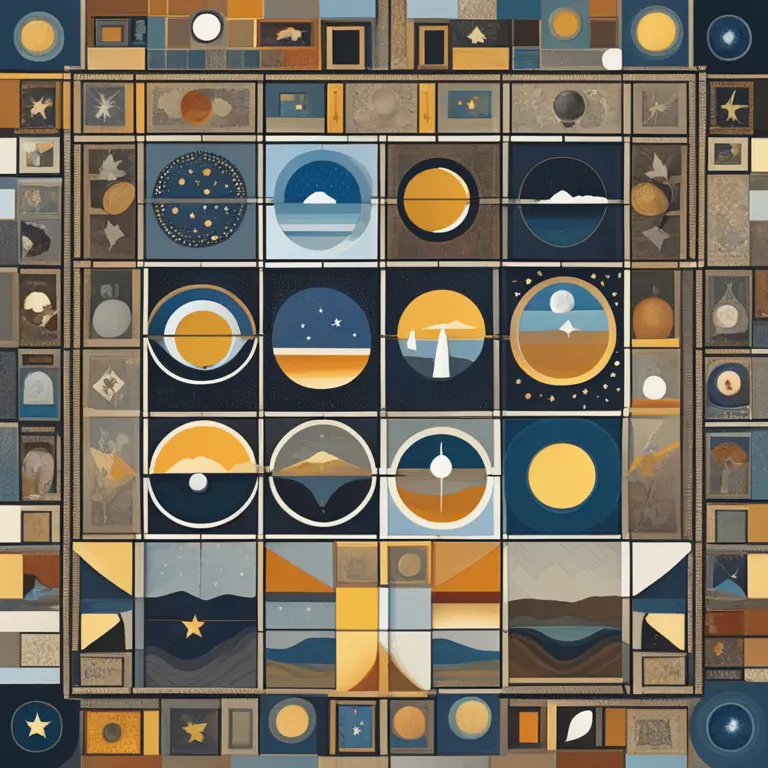
The Moon’s Phase at Birth: Cosmic Influence or Myth?
Examine the captivating notion of the moon's phase during childbirth and its potential effects on personality and destiny.
article by Priya Deshmukh
Moon Phases: Cosmic Imprints?
Does the luminous moon, with its cyclical dance through the night sky, leave an imprint on those born under its watchful glow? The fascination with lunar influence stretches back to ancient times, with many cultures imbuing the moon with mystical powers over the ebb and flow of human life. In astrology, the moon represents our inner world, emotions, and intuition. The phase of the moon at the moment of birth is alleged to exert a subtle but profound influence on one's personality and path in life. This celestial body, revered and astrologically significant, is thought to bestow its energy upon newborns, granting them characteristics reflective of its lunar stage.

Scientific Scrutiny of Lunar Lore
While palmistry and horoscopes thrive on symbolic interpretations, science demands empirical evidence. Studies pertaining to the impact of lunar cycles on human behavior and birth rates have yielded mixed results. Some research suggests correlations between full moons and an uptick in deliveries; others debunk such claims as mere coincidence. Yet, the enigmatic allure of the moon continues to inspire both astrologers and expectant parents, keen to discern patterns in the tapestry of existence. Despite the lack of robust scientific endorsement, the narrative of lunar birth influence persists, a testament to the human yearning for cosmic connections.

Phases of Fates: Espousal of Astrology
From the new moon's association with beginnings and the promise of growth to the full moon's reputation for culmination and heightened emotions, each phase holds specific astrological significance. A child born during the waxing moon, for instance, might be seen as growth-oriented and expansive, pursuing new endeavors with vigor. In contrast, a waning moon might hint at a contemplative nature, with introspection and a tendency to internalize experiences. The dark moon, or the period just before a new moon, traditionally associated with endings, could suggest a predisposition for transformation and rebirth. These astrological interpretations offer a rich, symbolic framework for understanding the diverse tapestry of human personality.

Personal Anecdotes versus Collective Data
Delving into individual experiences presents a mosaic of testimonies championing the moon's effects on birth and character. Parents and practitioners of astrology share poignant stories illustrating lunar correlations with temperament and fate. Nonetheless, these accounts remain anecdotal, and attempts to extrapolate them to the wider populace must be made cautiously. In the absence of conclusive scientific affirmation, adherents of lunar influences rely on a blend of faith, tradition, and anecdotal treasures to sustain the moon's enigmatic legacy in human birth.

Embracing the Mystique in Modern Times
As we stand at the threshold of 2024 and beyond, society continues to juggle scientific rationalism with a deep-seated enchantment by the cosmos. The digital age has given rise to websites and applications analyzing celestial movements with the promise of personal insights. Whether viewed through a lens of skepticism or belief, the proposition that moon phases impact birth remains a compelling narrative, uniting generations in wonderment at the mysteries of the universe. It invites us to consider the possibility that life's tapestry is woven not only from visible threads but also from the subtle, celestial strands of the moon's influence.
Published: 1/19/2024
Modified: 1/19/2024
More predictions
Come back here soon to learn more about yourself and your future


The Lunar Cycle: Phases of the Moon
Delve into the celestial mechanics behind the moon's phases and how they influence the rhythm of life on Earth.


Optimal Moon Phases for Successful Deer Hunting
Discover the impact of lunar phases on deer activity and learn when to plan your hunting trips for the best chances at a successful harvest.


Best Moon Phases for Optimal Fishing Success
Discover the optimal moon phases for fishing and how they influence fish behavior, enhancing your chances for a successful catch.